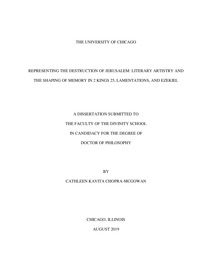My dissertation, Representing the Destruction of Jerusalem: Literary Artistry and the Shaping of Memory in 2 Kings 25, Lamentations, and Ezekiel, analyzes three biblical works concerning the fall of Jerusalem in 586 B.C.E. at the hands of the Babylonians: the prose narrative of 2 Kings 25, the poetic elegy of Lamentations, and the prophetic commentary of Ezekiel. My project challenges and significantly diverts from the long-held scholarly argument that there is a single, stable event that stands behind each text, and that the event can be reconstructed like a puzzle; that the biblical materials, the archaeological portrait, and the accounts from the Neo-Babylonian chronicles are individual pieces that add up to a finished, single, and coherent picture, a reliable account of the past. Through a literary, archeological, and comparative philological study, I demonstrate that there is in fact no single perspective on the destruction or its aftermath, and no way in which to reconstruct ‘what really happened’. I draw on cognitive memory studies to illustrate how memory is a highly complex system of encoding that draws on not only the experience of the event itself, but also on prior knowledge and value systems, influenced by the moment in which the remembering takes place. The concept underlying this project is very simply that events of this magnitude don’t actually ‘happen’: we turn them into events only afterwards, ascribing to them a coherence and clear delimitations that are not present when the experience is taking place. The stability of an event is a theoretical position. The shaping of the experience is a constitutive, second-order move, and becomes the event. This constitutive power also suggests that the event can be tailored to respond to a specific prompt. My dissertation thus seeks to identify the prompts that generate and structure Kings, Ezekiel, and Lamentations. Specifically, my study makes three major arguments and contributions to biblical scholarship: first, that renewed examination of the literary structure and images in 2 Kings 25 in light of Akkadian idioms and terminology will show evidence of engagement with a Neo-Babylonian imperial worldview. Second, that Lamentations is not a prayer for deliverance or restoration but an indictment of Yahweh’s fitness to rule Judah. Appealing to an established ancient Near Eastern code of royal masculinity, Lamentations levels a sophisticated critique of Yahweh’s ability to be king of Zion. Third, that Ezekiel uses narrative to construct a multi-level retrospective of Jerusalem’s destruction, its relationship to Yahweh, and the memory of that event. In addition to offering three new interpretations of biblical texts, my dissertation argues that the biblical texts cannot be assumed to be reliable and thus as factual accounts for modern historiographical purposes. Instead, these texts exploit the literary quality of their works to actively construct authoritative cultural memory of the period of the destruction of Jerusalem. In so doing, my dissertation diversifies both the scope of inquiry and the methodologies used to interpret and analyze biblical texts.

No comments:
Post a Comment